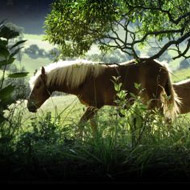MPs back new fly-grazing laws

"It is clear that the number of horses being left to graze on private land has grown significantly in recent years".
New laws to tackle illegal fly grazing in England have won the support of the Government and the Environment, Food and Rural Affairs (Efra) Committee.
A bill promoted by Julian Sturdy, MP for outer York, will allow faster removal of horses left to graze on private land without permission. It will also reduce the period of time before landowners can take action, from 14 days to around four.
Efra Committee chair Anne McIntosh, said: "It is clear that the number of horses being left to graze on private land has grown significantly in recent years, and we are glad that action to make it easier to deal with that is being supported by Defra and the Government.
"It would be helpful if the action taken in Ireland to deal with this problem were matched."
A letter to the committee from animal welfare minister, Lord de Mauley, explaining changes to the legislation has now been published.
Under previous legislation, those detaining fly-grazed horses can only sell them at market or public auction, however the Bill on the Control of Horses (England) 2014 allows more flexibility, so horses can be euthanised, rehomed or given to a charity.
Lord de Mauley also reports that progress has been made in securing legislation for a Europe-wide equine database. A new regulation agreed in September 2014 requires all member states to hold a central equine database.
In addition, there will be new minimum standards for horse passports and governments will have greater power to suspend or ban organisations from issuing passports if they fail to meet requirements.
Microchipping controls will also be tightened up and there will be a requirement to notify the database and passport issuing organisations if a horse has been signed out of the food chain.
These new rules will become national law in due course and the UK database will be set up in mid-2016.



 The veterinary mental health charity Vetlife is inviting the veterinary community to join it for a sponsored cold-water dip.
The veterinary mental health charity Vetlife is inviting the veterinary community to join it for a sponsored cold-water dip.